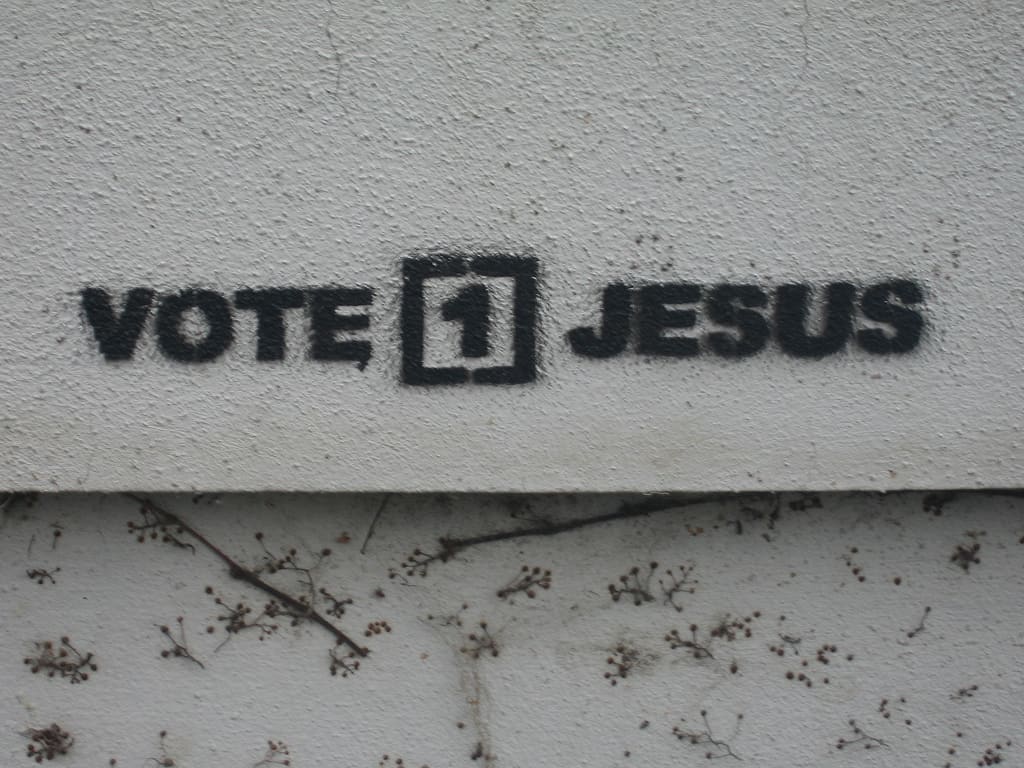I did not want to write this piece. There’s less danger in wearing a Derek Jeter jersey to Fenway Park on Patriots’ Day than in delving into the question of how faith and Church teaching should inform decisions in the voting booth. I can think of no other topic that presents such a comprehensive opportunity to be misunderstood and excoriated from all sides of every issue involved. Fools rush in, however, where angels fear to tread — so here we go.
Actually, allow me one more caveat, this one from Michael Rozier’s example in his excellent piece about the HHS mandate debate:
I am not interested in providing a position. If you’re looking to score points in a debate then you probably should look elsewhere. But if you want to engage other people in conversation on a topic as neuralgic as they come these days, then I hope what I offer will be helpful.
I am not going to tell you for whom you should vote. (For one thing, I don’t even know how I’m going to vote and have convinced myself of at least three different options in the course of writing this essay; for another, while I still have a few years before I will be ordained, I don’t plan to preach politics from the pulpit then, and I’m certainly not going to start now.) I am tempted to wash my hands of the whole mess, to stick my nose back in my theology books and myself back in the chapel, to remind myself that I live in Massachusetts and my vote for president is not going to matter, and to continue to pray for whatever leaders we get since the whole thing appears to be going to hell in a handbasket anyway. But … the impulse to hide from a difficult issue to avoid discomfort is, as we say, usually not from the good spirit. And even as I stick my finger into the religio-political light socket, I believe there is reason to hope. Let me tell you why.
From Despair to Hope
With the announcement of Romney’s choice of Paul Ryan as his vice-presidential nominee, we now know that no matter what happens in November, the next vice-president will not only be a Catholic, but a Catholic whose political positions are in significant conflict with Church teaching on matters of importance, even to the point of being publicly criticized by bishops.1
Paul Ryan rebuked on poverty by US bishops? Yes. But no party fully reflects Catholic teaching.Biden was rebuked too: catholic.org/politics/story…
— James Martin, SJ (@JamesMartinSJ) August 12, 2012
When I look at the mess that political professionals have made of putting their faith into practice, there are times I find myself tempted to despair — “the understandable, but unfortunate impression that [a Catholic’s] only political option is to choose a side and join in to win the culture war” as Bishop Richard Pates of Des Moines described it last week in America.
But there is reason to hope, as Bishop Pates reminds us, because the application of faith to the political order is not based on the vision of victory of one party or another, but of the kingdom of God:
The Catholic vision is one of collaboration, not coercion, among individuals, governments, businesses and other institutions. Its focus is not on profit or a winning ideology. Its focus is on creating conditions in which people can develop and ultimately flourish, in which their lives enjoy non-negotiable protection from conception to natural death, and thus can fully reflect the dignity God intended.
But even inspired by that vision, we can feel badly torn in two directions, as Fr. James Martin says in his conversation with MSNBC’s Joy Reid, between (for example) a party that defends the life of the unborn and a party that defends necessary services for the poor.
The Higher Bar
Plenty of ink has been spilled — and plenty more will be in this election season — trying to parse out how exactly we should prioritize those obligations, given that neither party and no candidate is proposing anything like the full Catholic vision. I’m not going to add my voice to the din.2 What I will say, instead, is that we must not let the limitations of electoral politics become the bounds within which we seek to put faith into practice in the public sphere. If all we’re asking is which party’s platform is more minimally adequate to the demands of our faith, then we’re going to continue to be badly disappointed. Under those conditions, getting one aspect of moral or social teaching right becomes a license to ignore all the rest, so long as the other party or candidate is even worse. The Gospel sets the bar considerably higher — even at a minimum — than any party is currently willing to reach for.
For that, there’s plenty of blame to go around. The Republicans still oppose abortion, for which they deserve praise. However, the pledges against raising taxes even one iota, no matter what the reason, no matter whose food stamps have to be cut to paid for it, appear to be held more absolutely than convictions about the dignity of human life. The Democrats argue for a robust social safety net, for which they deserve praise. But while they may welcome Catholic contributions on the social justice positions, opposition to the party line on issues of sexuality and abortion is barely tolerated, with the moral arguments behind the Catholic positions more often ignored or caricatured than engaged and responded to.
Here’s the rub, though — where I say “Democrats” and “Republicans,” what I really mean is “we.” We Catholics, we people of faith: we’ve got the politicians we chose, the ones we formed in our own faith communities, the one’s we’ve supported and financed and allowed to represent us. Bishop Pates points out that Catholics account for 29% of Congress, and hold 17 governorships. With those numbers, the continuing absence of options that better respect the full range of Catholic concerns suggests that the problem is not representation, but formation. Do Catholic politicians really understand and believe what the Church proposes? If not, why not? Are Catholic voters raising their voices to ask for and support candidates whose moral vision is larger than their party platform? Are we really interested in our political choices being illuminated by our faith? Or do we just want to be able to justify ourselves every fourth November?
I have voted for both Democrats and Republicans. In a number of cases, and on each side, I’ve had cause to regret and reconsider the process by which I came to my decision. I am not suggesting that establishing better options in the political sphere, or making better choices in the voting booth, is easy. I have friends who work in politics and in government from both sides of the aisle who are struggling (I use the word intentionally; they struggle) to put their faith into action. I am grateful for their dedication. I do not envy them their task.
We must live, and ultimately we must vote, in the real world, a world which will continue to involve very imperfect partisan politics. But the world ought not revolve around partisan politics. And political parties do not define the answers we can give to the questions posed by faith. The math of the electoral college cannot establish a horizon for the demands of the Gospel, nor for our hope, and we are obligated to hope — and to work! — for something better than the lesser of two evils.
Who would Jesus vote for? I have no idea, none at all.3
But I do think I know what Jesus has already said about whether the poor or the unborn are more deserving of our political concern: “What you did not do for one of these least ones, you did not do for me” (Mt 25:45).
And I also know what Jesus has said about those who hunger and thirst for righteousness: they will be satisfied.
That’s reason to hope — and not to be satisfied by anything less.
Author’s note: comments are welcome and encouraged, and will be moderated as necessary to maintain a civil and respectful conversation. Arguments that are purely partisan or that attack particular candidates or parties are unlikely to be helpful. The question is not “which candidate/party is better?” but “how can Catholic participation in political life more fully reflect the Gospel?”
— — — — —
- In 2008, Biden’s bishop publicly corrected his claim that Church teaching on abortion leaves room for debate and nuance about whether or not the unborn deserve legal protection; the current state of the bishops’ disagreement with the administration over mandated coverage for contraception and sterilization speaks for itself. In 2012, the House Republicans’ budget proposal, architected by Ryan, drew not one but five letters from various USCCB committees concerned about the degree to which the budget “rel(ied) on disproportionate cuts in essential services to poor persons” and neglected the government’s legitimate role in protecting the weakest members of society. ↩
- I will, however, add a footnote to the din, and point out that the bishops’ teaching document on Catholic participation in political life, Forming Consciences for Faithful Citizenship, explicitly avoids proposing any simplistic resolution of this problem: “It applies Catholic moral principles to a range of important issues and warns against misguided appeals to ‘conscience’ to ignore fundamental moral claims, to reduce Catholic moral concerns to one or two matters, or to justify choices simply to advance partisan, ideological, or personal interests. It does not offer a quantitative listing of issues for equal consideration, but outlines and makes important distinctions among moral issues acknowledging that some involve the clear obligation to oppose intrinsic evils which can never be justified and that others require action to pursue justice and promote the common good” (from the 2011 introduction to the document; see also paragraphs 31-37 on the complexity of prudential judgment as it applies to political choices and voting for candidates). ↩
- In fact, I suspect, based on his answer to the question about taxes to Caesar, that he would creatively undermine the question — by, for instance, showing up as an undocumented immigrant, or a felon convicted of civil disobedience, and testify against injustice by being unable to cast a legal vote. ↩




